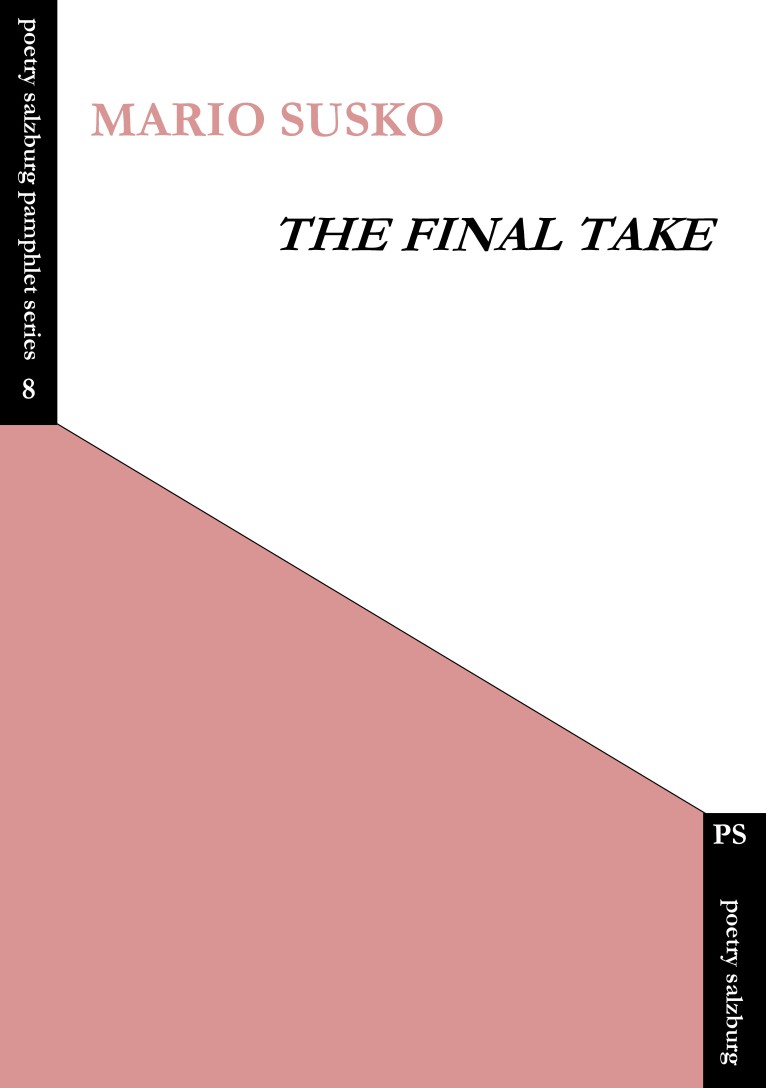 | Mario Susko
The Final TakeMay 2013. 40 pp. ISBN-13 978-3-901993-39-8 (= PSPS 8)
£6.00 (+ 3.00 p&p), €6.00 (+ 3.00 p&p), US$ 8.50 (+ 4.50 p&p)
"Susko is a metaphysical time keeper, a philosophical detective sifting through the desolate inconclusive evidenceleft by war and human desolation, the relentless alienist unraveling through dialogue and symbol, the deceptivetangle of memories and dreams, probing the borders between sanity and madness, reality and dream. He is a cinematographerof language, capturing the dialectics of existence and survival in flickering, indelible images." Robert Karmon
"To record history is both to record and to alter it, but the poet's harder task is to resist this type of petrifyingobfuscation and preserve the experience without simply repeating it. This is what Susko attempts to do."Tim Wood |
Order copies of The Final Take via PayPal:
Excerpt from The Final Take
Grandfather and I: Playing Chess
Grandfather was dying like a tree,
from inside, yet kept moving his and
sometimes my pieces to teach
me to read the adversary's mind.
My eyes would be glued to the chipped cross
on the king's head, patches of faded color
on the troops, as if they suffered from a skin
disease soon to affect their wooden soul.
Playing chess, he'd say, makes you answer
only one question, what is there in me
that makes me want to win and see.
To lose I will have to defeat myself.
I'd follow his hand, the three fingers holding
a piece as if it were an extension
of him about to invade the space
and change the configuration of being.
Then I would hear the click of the timer
and have to keep an eye on my flag,
while his hand hovered above the board,
a limb casting an ominous shadow.
Chess is like life, my dear boy, anticipation,
and you always bear in mind you play
against yourself, yet have to anticipate what
my next move will be before you make yours.
But how, I asked one day, if you play
against yourself, and he looked at me,
that's because you play against two people,
your opponent and yourself, knight to F3.
He never favored any particular piece
except his beautifully carved knights,
for me just horses' heads with a savage look,
poised to trample my elegant bishops.
The last time we played, his hand
was shaky, a dead twig in the fall wind,
his eyes fixed on something beyond me,
beyond the board, even his own dry stare.
Shortly after his death, grandmother
brought the box, He carved the whole set,
you know, during the war, and he wanted
you to have it, but the timer is missing.
Later I opened the beat-up box, took out
every piece with my three fingers and placed
it in its square, all of them lined up
perfectly for me to make my move: knight
to F3, which he answered with knight
to F6, the two of us playing furiously,
as if racing against the flags, my moves
taking me away from death, his, back to life,
until, in the end, he chased my last pawn
down, and I chased his last pawn down,
the two kings standing at the opposite sides
of the board, roaring with laughter.
Reviews of The Final Take
"In this volume, there are three immediately discernible coordinates: memory, waiting, and time. Like many other trinities,these large abstractions are three aspects of one thing. They are recombinant coordinates that continually reconstellatearound an invisible center. The center around which these poems wheel is the eye of the witness of a war that has beendeclared over and has since slunk from the light of experience and into the shadows of historical events. [...] Susko seeksto record something that puts to rest the aftereffects of having survived, making out of poetry a kind of prolepsis that fillsthe void of an apocalyptic delay. And so the poems trudge toward a horizon that rips across the skyline like a mass graveas the attempts at memorializing, at making things appear by keeping time, ultimately falter: 'Then you disappeared,that is / what happens in wars.' Finally, it is disappearance itself that appears in the wake of these vanishings."
Tim Wood, Colorado Review 40.2 (Summer 2013)
Click here to read the full review.
Read more about Mario Susko
Send an e-mail to order this book
